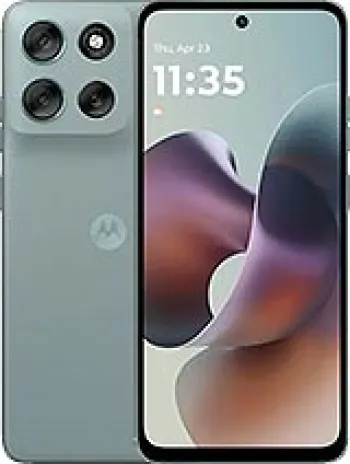
Overview of Motorola M3888
The Motorola M3888 is a mobile phone that was released in the late 1990s, specifically announced in 1999. As a feature phone, it provided basic mobile functionality before the advent of modern smartphones. The device focused on essential communication features, primarily targeting casual users and those prioritizing text and call functions over more advanced capabilities.
Design and Build
The Motorola M3888 comes with dimensions of 140 x 50 x 25 mm and a weight of 170 g, making it a handheld device that's relatively easy to carry given its purpose during its time. It's equipped with a monochrome graphic display that supports a resolution of 2 x 12 characters. While this might seem limiting today, it was quite typical of the devices in that era. The phone also supports Mini-SIM cards, sticking to the conventional standards of the time.
Display and User Interface
The phone is equipped with a basic monochrome graphic display. This kind of display was a standard feature at the time, offering essential visual feedback to the user for calls and text messages. With a display size catering to only two lines of text, users could view 12 characters per line, enough for basic communication tasks.
Network and Connectivity
Operating on GSM technology, the Motorola M3888 supported GSM 900 and 1800 bands. However, it did not feature GPRS or EDGE networks, which were precursors to today’s 3G and 4G technologies. Furthermore, its lack of support for WLAN, Bluetooth, or any form of internet connectivity limits it purely to voice calls and SMS functionality, typifying a time when phones were just starting to break into more connected experiences.
Battery and Power Management
The device is powered by a removable NiMH 700 mAh battery. Considering the phone's limited feature set, this provided a stand-by time of up to 110 hours and a talk time of approximately 230 minutes. The balance between functionality and power savings was effective for users who primarily needed a phone for calls and text messages only.
Memory and Storage
Motorola M3888 provided storage functionalities characteristic of feature phones, relying solely on SIM cards for its phonebook. Users could store call logs for 10 dialed numbers, 5 received calls, and 5 missed calls, reflecting the minimalist approach taken by feature phones before the smartphone evolution where internal storage became a feature to note.
Sound and Alerts
The phone's alert system is based on monophonic ringtones, a standard at the time. It lacks both a loudspeaker and a 3.5mm audio jack, reinforcing its focus on basic call and alert functionalities over multimedia features which were not a standard consideration during its time.
Messaging and Communication
Primarily designed for SMS communication, the Motorola M3888 offered basic messaging capabilities without support for more advanced messaging protocols that would come later. Despite this limitation, it supported 26 languages, showing an emphasis on accessibility to a diverse user base across various regions.
Additional Features
The Motorola M3888 was devoid of the plethora of sensors and advanced features found in modern-day devices. It didn't include a browser, games, or other multimedia functionalities, focusing instead on its core purpose of facilitating voice calls and text messaging only.
Contemporary Relevance
In today’s technological landscape, the Motorola M3888 could be considered a collector’s piece, offering an insight into the evolution of mobile phone technology. It represents a time when phones were centered around voice communication and basic text messaging, devoid of the apps and connectivity that we take for granted today. As such, it holds nostalgic value for users who experienced the initial mobile phone revolution.
Conclusion
The Motorola M3888 remains a relic of a past technological era, characterized by simplicity and the primary function of mobile communication. While it lacks the features and technological advancements of modern phones, it stands as a testament to how far mobile technology has developed over the decades, from basic communication tools to the complex, multi-functional devices we rely on today.
Key Features of Motorola M3888
- GSM 900 / 1800 Technology
- Compact Dimensions: 140 x 50 x 25 mm
- Lightweight at 170 g
- Monochrome Graphic Display
- Phonebook stored on SIM only
- Call Log: 10 dialed, 5 received, 5 missed calls
- Support for SMS Messaging
- 26 Supported Languages
- Removable NiMH 700 mAh Battery
- Stand-by time up to 110 hours
- Talk time up to 230 minutes
Disadvantages of Motorola M3888
- No GPRS or EDGE support, limiting data connectivity
- Discontinued model, no longer supported
- Bulky and heavy design (170 g)
- Monochrome graphic display with very limited resolution (2 x 12 chars)
- No memory card slot for storage expansion
- Phonebook limited to SIM storage only
- Very limited call records capacity (10 dialed, 5 received, 5 missed)
- No integrated camera
- No loudspeaker, lacking multimedia features
- Monophonic ringtones only, without a 3.5mm jack for headphones
- No modern communication options like WLAN or Bluetooth
- No positioning, radio, or USB connection
- Lacks essential features like a clock, alarm, and games
- Removable NiMH battery with low capacity (700 mAh)
View Also
More Phones
All Rights Reserved +14266 Phones © Mobilawy 2025

























